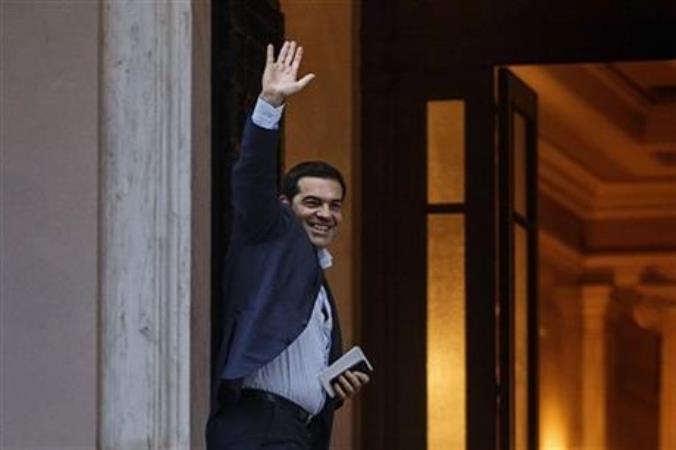
Greece and its rescue creditors edged closer to a deal on loans needed to avoid a potentially disastrous bankruptcy, but angry objections in Athens to some demands kept the talks on edge ahead of a key meeting this weekend.
The government on Friday agreed to key reforms that are close to what creditors have demanded before they release new loans, officials said on condition of anonymity because of the sensitivity of the negotiations.
The creditors in return offered Greece a five-month extension to its bailout program, which would otherwise end Tuesday, leaving the country facing a financial meltdown.
Without new loans and a bailout extension, the country would default on a debt due Tuesday and its banks could be left to collapse. Together, the events could push Greece to leave the euro, a move that would drive the country back into a deep, long recession and shake European and global markets.
Greece said the creditors' offer for a bailout extension — which includes incremental loan disbursements linked to Greece's repayment schedule — was insufficient. Prime Minister Alexis Tsipras expressed his annoyance at the creditors' demands.
"The European Union's founding principles were democracy, solidarity, equality, and mutual respect. These principles were not based on blackmail and ultimatums," he said leaving Brussels after a week of intense negotiations.
Greece offered a first set of concessions earlier this week and added more on Friday, including a proposal to slash state spending on pensions — something creditors had demanded.
"The difference now is very, very small" between the two sides, an official from one of the creditor institutions said.
Markets rose on news of the new concessions, with the Athens stock index closing up 2 percent and other major European indexes edging higher.
Eurozone finance ministers will meet in Brussels Saturday to try and hammer out a final deal, which will require swift parliamentary approval in Greece before Tuesday.
"Tomorrow's meeting is of a decisive character," German Chancellor Angela Merkel said after meeting Tsipras and French President Francois Hollande.
European Commission President Jean-Claude Juncker agreed.
"There is a real chance to conclude an agreement," he said, describing Saturday as "a crucial day not only for Greece but for the euro area as a whole. I'm quite optimistic but not overly optimistic."
Greece's finance minister said he was optimistic a deal would be possible Saturday, but also voiced hopes that talks could continue beyond that.
"I am amazed by how many times in recent months I have been told that if you don't do this by then we are heading for the rocks," Yanis Varoufakis told Greece's Ant1 TV. "All these deadlines are attempts to get our signature on an agreement that extends the crisis instead of solving it. We will not do that."
Varoufakis said there was "no chance" of Greece accepting its creditors' latest proposals.
"This is a package that condemns Greece to another four or five months of constant, daily negotiations," he said.
According to the text of the creditors' proposals seen by The Associated Press, Athens was offered an extension to its bailout program through November, with loans worth 15.5 billion euros. That includes 7.2 billion euros from the existing rescue program and money left over from a bank rescue fund.
"The gap between Greece and its creditors looks much smaller now that Greece has caved on some of its proposed pension reforms," said Megan Greene, chief economist at Manulife Asset Management.
But the added austerity is likely to keep Greece in recession for a seventh successive, she said, and not address many of its economy's underlying problems.
"The big questions are whether the government will survive this deal, whether the deal is at all implementable, and whether Greece can find a large pot of money to recapitalize its badly ailing banks," she said.
Worried Greeks have been pulling their money out of banks, fearing a failure in the negotiations could lead to financial turmoil and a restriction on banking transactions. An estimated 4 billion left Greek banks last week.
The European Central Bank has been supporting the Greek banks — and frequently increased that aid this week as they struggled to cope with the drain of deposits. But it would be under pressure to pull the plug on the banks if Greece's bailout program expired and there was no prospect of a financial rescue for the country.
Elected in January, Tsipras' left-wing government has long been adamant it would not impose any new austerity measures, after cuts made in previous years put the country through years of recession and caused mass unemployment and poverty.
His concessions to creditors have mainly consisted of tax increases, mainly on businesses. Creditors worried that, while such taxes might spare the poor in the short-term, it would hurt the overall economy too much.
Tsipras' latest concessions include an offer to ax state spending for pensions by 0.25-0.5 percent this year and by 1 percent next in 2016. The announcement caused consternation within Tsipras' ruling leftwing Syriza party.
Tsipras returned to Athens on Friday as about 8,000 gathered people outside Parliament in a peaceful anti-austerity protest organized by the Communist Party.
He chaired an emergency cabinet meeting — ending a week that saw the nation's politicians, television anchors, and pundits gather in Brussels to provide rolling television coverage of the dramatic negotiations.
Greece's powerful Orthodox Church also intervened Friday, and wrote a letter to the creditors asking them to help find a deal.
"We ask that you show restraint, understanding and solidarity to find a mutually acceptable solution to the Greek financial problem," the letter said.
"Particular care must be taken so that measures to improve the living standards of the Greek people, who have struggled tremendously over the last five years."
